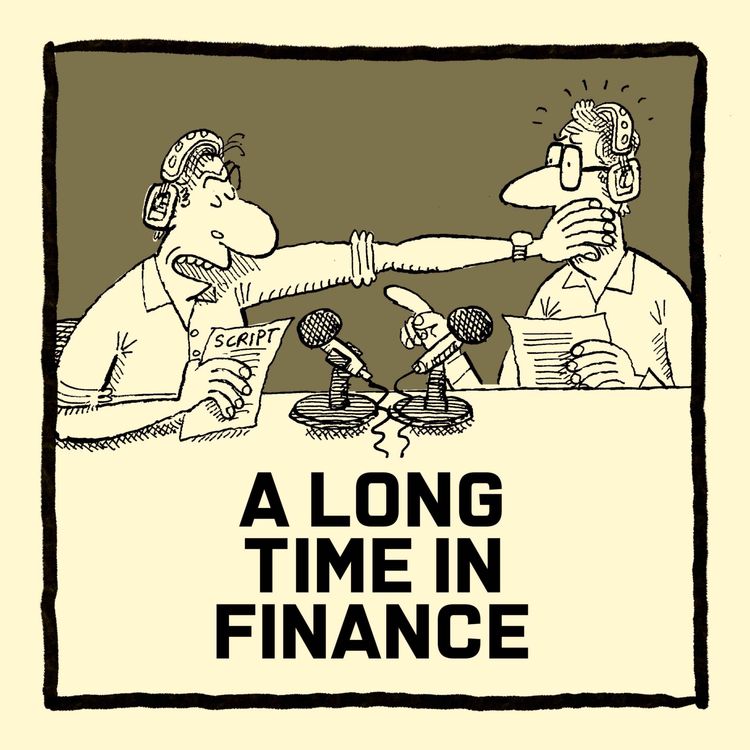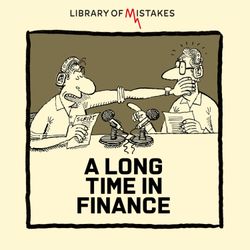Share

A Long Time In Finance
Long Time Short: The Dutch Bond That Kept On Giving
•
On May 15 1648, the same day Holland signed the Treaty of Munster ending its 80 year war with Spain, a Dutch canal board issued a bond of 1,000 Carolus guilders to a Mr Niclaes de Meijer of Utrecht promising to pay him 5 per interest in perpetuity. In the latest of our Long Time Shorts, Jonathan explains how that promise is still being kept 374 years later, what Mr de Meijer's bond might be worth today, and why the Dutch are so good (relatively speaking) at meeting their financial obligations. Lang leve Nederland!
Presented by Jonathan Ford and Neil Collins.
Produced and edited by Nick Hilton for Podot.
In association with Briefcase.News
More episodes
View all episodes

The Derailment of Railtrack
29:39|It was supposed to bring in the cash to revive Britain's creaking railway network. But then it all went wrong for the listed network owner. A series of tragic accidents undermined public confidence, beginning the slow unravelling of rail privatisation as a whole. Neil and Jonathan talk to Gerald Corbett, one time boss of Railtrack, about the privatisation project, the accidents, and what went right and wrong.The show is made in partnership with The Library of Mistakes who are offering a 25% discount on their Advanced Valuation in Financial Markets course to listeners. Just follow this link https://www.libraryofmistakes.com/how-to/ and enter ALTIF25 into the box marked promo.Presented by Jonathan Ford and Neil Collins.With Gerald Corbett.Produced and edited by Nick Hilton for Podot.
New Year Special: The Guinness Scandal
29:37|It's often seen as the point where the City dumped its old gentlemanly mores ("My word is my bond") for a new "win at all costs" culture - one that the UK's new regulatory regime singularly failed to quell. But what was the Guinness Scandal of the 1980s all about, why was it important, and what were its consequences? Forty years on, we talk to author Nick Kochan about "Deadly Ernest" Saunders, boss of Guinness, the share-trading scandal, and the massive legal (and medical) swamp that followed. (Spoiler alert: it involves an actual medical miracle).The show is made in partnership with The Library of Mistakes who are offering a 25% discount on their Practical History of Financial Markets course to listeners. Just follow this link https://www.libraryofmistakes.com/how-to/ and enter ALTIF25 into the box marked promo.Presented by Jonathan Ford and Neil Collins.With Nick Kochan.Produced and edited by Nick Hilton for Podot.
How Britain Lost Its Shipbuilding Industry
30:51|Everyone knows that Britain once built almost all the world's ships, and now builds almost none. But what were the steps by which this mighty activity disintegrated? And no less importantly, how did it climb so high in the first place, when the US was the world's biggest ship building nation in the early 19th century? What are the economics of shipbuilding and do we need to build them? We explore the rise and fall of a great industry and all these questions with Brian Potter of the Institute for Progress.The show is made in partnership with The Library of Mistakes who are offering a 25% discount on their Practical History of Financial Markets course to listeners. Just follow this link and enter ALTIF25 into the box marked promo.Presented by Jonathan Ford and Neil Collins.With Brian Potter.In partnership with the Library of Mistakes.Produced and edited by Nick Hilton for Podot.
Britain's Energy Disaster
31:00|In the 19th century, Britain transformed itself into the workshop of the world by harnessing the power of coal and steam. Now a new energy revolution - that of renewable power - looks set to turn the UK into something closer to a workhouse inhabited by the destitute. But how did it all happen and why did politicians buy into it? We look at how Britain fashioned a disastrous energy trap for itself, and ask if there's any way out.The show is made in partnership with The Library of Mistakes who are offering a 25% discount on their Practical History of Financial Markets course to listeners. Just follow this link https://www.libraryofmistakes.com/how-to/ and enter ALTIF25 into the box marked promo.Presented by Jonathan Ford and Neil Collins.Produced and edited by Nick Hilton for Podot.
Barbarians at the Gate: A Short History of Private Equity
33:00|From a few tiny funds in the 1970s, private equity has transformed the financial world and is now a $7 trillion industry, accounting for 30% of the US private sector economy. But how did it all happen, why have pension funds poured so much into these funds, and how do the practitioners get away with paying themselves such eye watering fees? We talk to buyout expert Peter Morris about this strange modern act of financial alchemy.The show is made in partnership with The Library of Mistakes who are offering a 25% discount on their Practical History of Financial Markets course to listeners. Just follow this link https://www.libraryofmistakes.com/how-to/ and enter ALTIF25 into the box marked promo.Presented by Jonathan Ford and Neil Collins.With Peter Morris.In partnership with the Library of Mistakes.Produced and edited by Nick Hilton for Podot.
Britain's Melmotte? The Cautionary Tale of Robert Maxwell
30:55|The publishing mogul Robert Maxwell lived a life shrouded in mystery that was ultimately capped by great disgrace. But was he an out and out villain, like Anthony Trollope's fictional swindler in The Way We Live Now, or a more nuanced and tragic figure? We discuss the life, legacy and deals of the great pension purloiner with his biographer, John Preston. Hosted by Jonathan Ford and Neil Collins.With John Preston.Produced and edited by Nick Hilton for Podot.Presented in partnership with the Library of Mistakes.
The Green Shield Stamp Story
30:31|With Britain's economy mired in 1970s misery, we thought we'd brighten things up a bit. So this week we present the most 1970s story ever: the history of GREEN SHIELD STAMPS! Oldies will know, but for younger listeners, you collected them in books, kids, and exchanged them for glass tumblers and soda syphons. Groovy huh? Neil and Jonathan talk to Prof Leigh Sparks about how they worked and changed British retail for ever.The show is made in partnership with The Library of Mistakes who are offering a 25% discount on their Practical History of Financial Markets course to listeners. Just follow this link https://www.libraryofmistakes.com/how-to/ and enter ALTIF25 into the box marked promo.Presented by Jonathan Ford and Neil Collins.Produced and edited by Nick Hilton for Podot.
The Art of the Shred
34:08|Fred Goodwin led Royal Bank of Scotland to ruin and Britain to the brink of financial disaster. But who was the man they called Fred the Shred and how did he build RBS into (briefly) the world's largest bank? And how was he allowed to make such a complete horlicks of it? In our first live show at the Library of Mistakes in Edinburgh, Neil and Jonathan discuss these issues with Ian Fraser, author of Shredded, the seminal history of the fall of RBS. The show is made in partnership with The Library of Mistakes who are offering a 25% discount on their Practical History of Financial Markets course to listeners. Just follow this link and enter ALTIF25 into the box marked promo.Presented by Jonathan Ford and Neil Collins.With Ian Fraser. In partnership with the Library of Mistakes.Produced and edited by Nick Hilton for Podot.
The Great QE Rip-off
26:46|QE or QT? The impact of these hangover expressions from another era is only now becoming apparent. Christopher Mahon of Columbia Threadneedle talks to Jonathan and Neil about how the Bank of England bought government stocks and sold them back at a loss. One example:paying £101 (QE) and later selling it for £28 (QT). The cost of this insane behaviour to the taxpayer? Probably over £115 billion (that's billion).Secure your tickets to our live event in Edinburgh – on the life and times of Fred 'the Shred' Goodwin – by clicking here. Presented by Neil Collins and Jonathan Ford.With Christopher Mahon.Produced and edited by Nick Hilton for Podot.